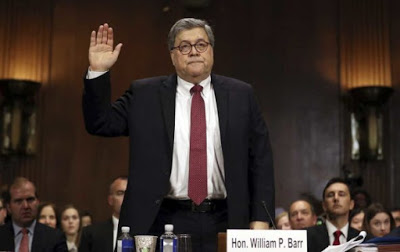Who’s afraid of William Barr?
 |
| Stephen F. Cohen 06/10/2019 |
Liberals and other Democrats seem to want to cover up the CIA’s role in Russiagate.
William Barr, a two-time attorney general who served at the CIA in the 1970s, would seem to be an ultimate Washington insider. According to his Wikipedia biography, he has—or he had—“a sterling reputation” both among Republicans and Democrats. That changed when Barr announced his ongoing investigation into the origins of Russiagate, a vital subject I, too, have explored.
As Barr explained, “What we’re looking at is: What was the predicate for conducting a counterintelligence investigation on the Trump campaign.… How did the bogus narrative begin that Trump was essentially in cahoots with Russia to interfere with the U.S. election?” Still more, Barr, who is empowered to declassify highly sensitive documents, made clear that his primary focus was not the hapless FBI under James Comey but the CIA under John Brennan. Evidently this was too much for leading Democratic Senator Charles Schumer, who assailed Barr for having “just destroyed…the scintilla of credibility that he had left.” Not known for a sense of irony, Schumer accused Barr of using “the words of conspiracy theorists,” as though Russiagate itself is not among the most malign and consequential conspiracy theories in American political history.
More indicative is the reaction of the generally liberal pro-Democratic New York Times and Washington Post, the country’s two most important political newspapers, to Barr’s investigation. Leaning heavily on the “expert” opinion of former intelligence officials and McCarthy-echoing members of Congress such as Adam Schiff, both papers went into outrage mode. The Times bemoaned Barr’s “drastic escalation of [Trump’s] yearslong assault on the intelligence community” while rejecting “the president’s unfounded claims that his campaign had been spied on,” even though some forms of FBI and CIA infiltration and surveillance of the 2016 Trump campaign are now well documented. (See, for example, Lee Smith’s reporting.)
Unconcerned by the activities of either agency, the papers warned ominously that Barr’s probe “effectively strips [the CIA] of its most critical power: choosing which secrets it shares and which remain hidden.” It “could be tremendously damaging to the C.I.A. and other intelligence agencies.” Not surprisingly, given the Times’ three-year role in promulgating Russiagate allegations, it preempted Barr’s investigation by declaring that US intelligence agencies’ covert actions were part of “a lawful investigation aimed at understanding a foreign power’s efforts to manipulate an American election.” Considering what is now known, this generalization seems a whitewash both of the Times’ coverage and the agencies’ conduct. (In the Post, see coverage by Toluse Olorunnipa and Shane Harris.)


